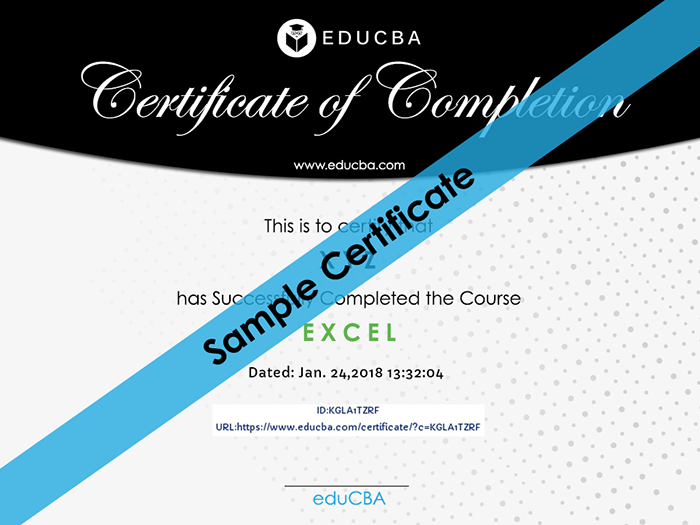- Duration / Course length: Upto 11 Hours Start now
- Certificates:
- Course delivery: This course is delivered in video format
Course details
The Supply Chain Management course covers following topics.Retail Supply Chain: In this section you learn about the supply chain system of manufacturers and retailers, similarities and differences in the manufacturing sector and retail supply chain elements, retail as a part of retail management and its supply chain planning and execution, strategic and tactical operations of the retail supply chain and its maturity.
Category Management: You are introduced to category management and the process category division. You also learn about category roles, assessment and performance measures, strategies and tactics, implementation and review to enable components of category management, and finally, the challenges of a category captain.
Merchandise Budgeting: This section is divided into four parts. It covers types and benefits of merchandising, merchandise hierarchy and forecasting, budgeting, and open to buy control.
Assortment and space management: Here you are introduced to the framework and benefits of assortment, objectives of assortment strategy and the assortment selection process, assortment planning and the role of data and IT in assortment management, types of store clustering and its benefits, the advantages of space management and integration with every state of assortment and space planning, and the planogram process and its management.
Retail Pricing Challenges: In this section you learn about the challenges to retail pricing, managing price elasticity and the retail pricing lifecycle, objectives of retail promotion, promotional measures and KPIs, decisional points in promotional tools for retailers, information used to plan promotions, optimization of the promotion process, and managing retail markdowns.
Retail Product Lifecycle Management: This section is divided into seven parts. You learn about challenges for the retailer regarding product design, types of private labels and their advantages and disadvantages, supply chain decisions at private levels, retail and green design packaging, and using IT for retail product lifecycle management.
Retail Distribution Replenishment: The topics covered in this section includes retail distribution models, vendor managed inventory and its process, VMICRP cautions and advantages, CPFR process, route accounting, direct store delivery, types of DSD and handheld devices, and how IT can help in retail distribution replenishment.
Retail Logistics: This section is divided into 10 parts. It covers transport planning and the legs in transportation, drivers tools, constraints in transportation and the execution process, transportation cycle and use of IT in transport management, measures of transport management and green transportation, functions and overview of retail warehousing, value added services of a retail warehouse and introduction to docking, types of cross-docking and their working, applications and advantages, why inventory is necessary, cost of inventory and the inventory pyramid, inventory factors to consider and inventory measures.
Retail Supplier Relationship Management: The topics covered include important concepts involved in supplier relationship management, merchandise procurement and decisions in this regard, pros and cons of global sourcing, and the key processes involved.
Retail Customer Relationship Management: In this section you'll be introduced to retail customer service and the customer service mix. The topics include the customer service pyramid and customer service over the retail life cycle, how to better customer service for retailers, order management process and concepts of a perfect order, multichannel retailing, retail returns, reverse logistics and its process, retail loyalty programs, and retail kiosks and advanced payment solutions.
Managing Supply Chain For Various Retail Formats: This section begins with examples of types of retailers, organized B2C, and retail formats. You go on to learn about cash and carry and rural retailing, non-store based retail formats, online shopping and airport retailing, and service retail banking and couriering.
Apparel and footwear retailing supply chain: Divided into five parts, this section helps you understand the development process and characteristics of the supply chain system of the particular industry sector, pre-pack planning, supply chain innovations in apparel retail and footwear, and a case study of Khadim's Footwear.
IT For Retail: The final part of the courseware deals with retail
technology, and the need for an IT maturity model in retail, barcode RFID, retail ERP and analytics, and POS systems and mobile applications. Updated on 23 March, 2023
Job roles this course is suitable for:
SUPPLY CHAIN MANAGER , Supply chain Executive , supply chain specialistAbout eduCBA
An initiative by IIT IIM Graduates, eduCBA is a leading global provider of skill based education addressing the needs 500,000+ members across 40+ Countries. Our unique step-by-step, online learning model along with amazing 5421 courses prepared by top notch professionals from the Industry help participants achieve their goals successfully. All our training programs are Job oriented skill based programs demanded by the Industry. At eduCBA, it is a matter of pride to us to make job oriented hands on courses available to anyone, any time and anywhere. Therefore we ensure that you can enroll 24 hours a day, seven days a week, 365 days a year. Learn at a time and place, and pace that is of your choice. Plan your study to suit your convenience and schedule.
What we do : We teach you real world skills on everything from Investment Banking to Programming to Project Management to Design – and much, much more.
How we do it : Through online video training. Our high-quality, skill-based 5421 video training programs help members achieve their goals successfully.





